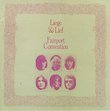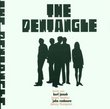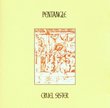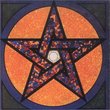| All Artists: Pentangle Title: Basket of Light Members Wishing: 9 Total Copies: 0 Label: Sanctuary Original Release Date: 1/1/1969 Re-Release Date: 11/24/2008 Album Type: Extra tracks Genres: Folk, International Music, Pop, Rock Styles: British & Celtic Folk, Folk Rock Number of Discs: 1 SwapaCD Credits: 1 |
Search - Pentangle :: Basket of Light
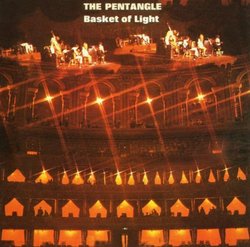 | Pentangle Basket of Light Genres: Folk, International Music, Pop, Rock
UK remastered reissue of the British folk super-group's 1969 album. Includes 4 bonus tracks, two alternate versions of 'Sally Go Round The Roses', 'Cold Mountain' (B-side single) & 'I Saw An Angel' (B-side single). 200... more » |
Larger Image |
CD DetailsSynopsis
Album Description UK remastered reissue of the British folk super-group's 1969 album. Includes 4 bonus tracks, two alternate versions of 'Sally Go Round The Roses', 'Cold Mountain' (B-side single) & 'I Saw An Angel' (B-side single). 2001 release. Similar CDs
|
CD ReviewsPentangle in their prime Skyburial | N-1400 Ski, Ski Norway | 06/13/2007 (5 out of 5 stars) "Let`s be honest. Most people who write reviewa on amazon are not reviewers, but mostly fans who write about music they love (sometimes loathe). And so I am not an objective judge of this music. The first Pentangle LP struck me right in the gut from the first note in the summer of 67: Sgt, Pepper was for everyone, Pentangle was for me. The solid, muscular and ever creative double bass of Danny Thompson bouncing off on the jazzy pulse of Terry Cox, the ghostly pure tones of Jacqui McShee, and the interplay between Bert Jansch and John Renbourn, perhaps the finest duo ever in the acoustic folk field, created a fusion of folk, jazz, blues, classical and rock unlike no other. The first LP was brilliant, but a formative stage of their sound. The second, Sweet child, contained some of their finest moments, but is at the same time an uneven mixture of different styles that don`t always come together. By their later albums, a tinge of tiredness was beginning to show. Listening through their output after having repaired my LP player, "Basket of light" stands as their finest hour, their one pefect album, having stood the test of time, sounding fresh and contemporary in 2007. The most striking is a luminous quality that shines through the tracks, making the title apt for the music. The songs melt into a seamless whole, with not a weak track and an internal logic in the choice and sequence of the songs. Light flight starts off with a bouncing mixture of time signatures showcasing how Jansch and Renbourn had grown from folkies playing with a slightly sloppy style to master musicians following Thompson and Cox into creative reaches of jazz fusion, Lyke wake dirge is a spine-chilling a capella medieval burial chant which arguably is the group`s finest vocal moment. Listen to the incredible interplay of the instruments on Hunting song, Terry Cox? glockenspiel adding to the "inner glow" that marks every track on the album. If you don`t want to dish out for the whole new 4-disc collection The time has come (also recommended), this album is, in my view, the perfect representation of all that this unique band stood for and achieved iln their glory days." Pentangle's best and one of the great albums of the era B. Schuman | NY | 11/24/2007 (5 out of 5 stars) "Pentangle were a ridiculously good band, but, as with many so-called "cult" musicians, you might say that they take time to grow on you.
That's how I felt before I heard Basket of Light. But then I heard Basket of Light, which is as awesome, and as accessible, as the band could get. Pentangle were always a little bit out of time. They were classified as a folk-rock band, but they were really more of a traditional folk band with a jazz rhythm section and, occasionally, some classically sophisticated harmonies and rhythms. On Basket of Light, the Pentangle still sound like an odd fusion between medieval folk and '40s jazz, but they remind listeners that this music was made in that special decade called the Sixties. Yet the Pentangle were only subtly effected by their era. There are still no fuzzy electric guitars or lyrics about freeing your mind, just a little sitar here, a little echoing harmonies there, and a general sense of experimentation. It's as if they had only picked up the most subtle trends of their time. The Pentangle were always eclectic, and this album is about as eclectic as they can be. On their debut, they could be described as a "melting pot" of styles, and on Sweet Child, they could be described as both a melting pot and a bargain bin. On Basket of Light, they're a continuous musical journey that spans centuries and continents. If albums were thrift stores, Sweet Child would be a large Goodwill, but Basket of Light would be an ideal thrift store in London's Camden Town that is small enough to navigate, full of clothes that wouldn't be uncomfortable to wear, and probably doesn't actually exist. Perhaps it was a blessing that this imaginative band of multi-instrumentalists was produced by Shel Talmy, the simple-minded studio genius who also produced the early albums of the Kinks. The songs sound complex without sounding overwhelming and dense. Instruments are just distinct enough without sounding too separate from the whole. A "simple" producer takes this complicated band a long way. And as for the individual songs? Let's talk about a few of them. "Light Flight" is a fast, upbeat song with simple lyrics, a classical melody, and a complicated rhythm. "Once I Had a Sweetheart," is an Anglo-American folk song that, with the help of a glockenspiel, sitar, and some consistent, tight drumming, gets launched into somewhere in outer space. High, clear vocals by Jacqui, and some haunting and unexpected backing vocals by Bert and John at the end, top it all off. "Springtime Promises" is a song about the changing of moods with the seasons. Like many songs from the sixties, it's about flowers and sunshine. But it doesn't come off like an ode to smoking grass while sitting on grass- it's not in that tradition as much as it is in the tradition of ancient songs and prayers from an era without heat or air-conditioning, when agriculture was supreme. It also features a deep, full, melodic, and enunciated vocal by Bert Jansch. Unlike many critics, I've always thought Bert Jansch has a great, if inconsistent singing voice, and this is certainly one of his most impressive vocal performances. After "Springtime Promises" comes "Lyke Wake Dirge," which is a pagan/early Christian chant with no real embellishment that manages to sound like it was recorded in a 13th century abbey yet, with the addition of some spare drums and guitar, doesn't sound out of place with the eclecticism of the rest of the album. "Train Song" has an even more complex rhythm than "Light Flight," and is done without any exotic instruments, because, if it had merely one note of droning sitar or glockenspiel, it would probably be too complex and psychedelic to function. With "Hunting Song," we're back to the feudal era, although not back quite as far as "Lyke Wake." It's genteel and creepy in a uniquely British way. Then comes "Sally Go Round the Roses." It's a cover of a '60s girl group song that manages to be both energetic and restrained. If the song came on in a coffee shop, everyone in the place would immediately feel infinitely cooler. Danny Thompson's prominent jazzy bass is key to this effect, but everyone else does their share as well. On this remastered CD edition, we get to hear this one three times! "The Cuckoo" is a lullaby in which Terry Cox takes out his glockenspiel again, and "House Carpenter" sounds like many of the traditional songs on Sweet Child, but with the key difference that Bert and John trade their guitars for a banjo and a sitar, respectively. I don't often choose favorites in any subject, and, when I do, I often change my mind. But I doubt that any other Pentangle album will replace this one as my favorite. Pentangle were an always interesting group and just about everything they recorded is worthwhile. But, as much as I like their other albums, if I had to choose only one, I would choose this one without hesitation." |

 Track Listings (9) - Disc #1
Track Listings (9) - Disc #1